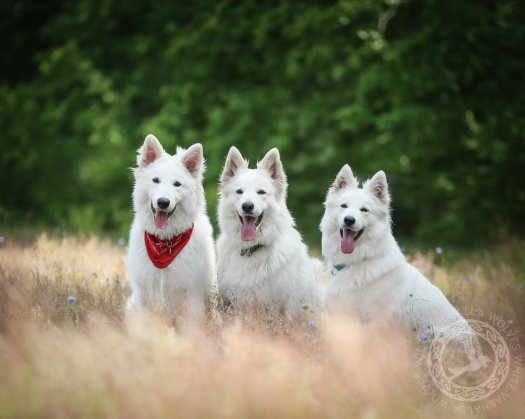02.07.2025 / Guides
White Swiss Shepherd breed description
A few weeks ago I had the opportunity to update the description of the White Swiss Shepherd Dog breed on our website. I decided to share it here too and ask if you agree with it from your own experiences :)
"White Swiss Shepherds are dogs that are eager to cooperate and learn. Their relatively high energy level requires proper management - regular training, consistency in handling, mental activity (e.g. nosework), a large dose of exercise.
Depending on the breeding line, association or individual issue, this energy level will vary, but shepherds are not really "couch potatoes" who only need a lazy walk. Properly handled, they can be a great family dog, and their versatility allows you to try different sports with them. Some individuals, with good training, can even count on success in many sports.
They are said to be a sensitive breed - which on the one hand means empathy for the current condition of their handler, great attachment to their human and sometimes also great tenderness. On the other hand, it may mean that these dogs require thoughtful socialization, not being thrown into extremely difficult situations right from the start. From our observations, it follows that most of them are however, balanced and self-confident dogs, or at least where attention is paid to the temperament of the parents and the appropriate socialization of the puppies.
To fully understand the essence of the breed, it is necessary to first learn the origins of white Swiss Shepherds. According to M. Redlicki, "The creator of today's German Shepherds was Max von Stephanitz, and their progenitor was a flaxen-gray, wolf-like dog, which von Stephanitz bought for his breeding and named Horand von Grafrath. Among the registered dogs there were also white and long-haired ones. One of the first exhibited shepherds, Greif, was white, and Baron von Knigge specialized in breeding dogs of this color. Horand himself gave white puppies in his numerous litters. However, in the 1920s, this color was considered undesirable, but it survived in the USA and Canada, and in 1977 the White German Shepherd International association was established there. At that time, white shepherds were brought back to Europe, first to Switzerland (1970), then to other countries. Since Germany did not agree to recognize them, the FCI proposed to register them as "white American-Canadian Shepherds", which the countries concerned did not agree to, claiming, quite rightly, that it was a German Shepherd. They were finally named White Swiss Shepherds, and were recognized in 1991."
Although the BOS and the German Shepherd are closely related and share many characteristics - loyalty, courage, intelligence and willingness to cooperate with humans - they are clearly different in terms of temperament and use. The BOS is more balanced, less nervous and easier in everyday life, primarily oriented to the role of a family and companion dog. Its disposition is friendly and training is easy, which makes it an ideal partner for active families who can provide it with the right amount of activity and exercise.
The FCI standard emphasizes this universality: the White Swiss Shepherd is a lively, alert dog, easy to train, friendly, never fearful or aggressive without reason. It can adapt to different conditions, combines the characteristics of a working and family dog, while demonstrating high social intelligence. However, despite the fact that it is increasingly playing the role of a companion dog, its primary needs - physical and mental activity - cannot be forgotten. Without the right activity, the BOS can quickly get bored and find their own, often undesirable ways of entertainment.
White Swiss Shepherds are dogs of exceptional beauty and character, which attract the attention and admiration of people unfamiliar with the breed on a walk. Many owners talk about love at first sight and claim that their next dog would also be BOS. As a relatively young breed, they can boast good health, and their gentle disposition and versatility make them perceived as ideal family dogs. However, the White Swiss Shepherd is not a dog for everyone. It requires owners who are aware of its complex needs, ready to provide it not only with exercise and occupation, but also a deep bond and responsible care. It is not a dog for solitary guarding or a decoration of the living room, nor is a daily, short walk around the block enough for it.
Personally, at the beginning of my adventure with this breed, what fascinated me most in the descriptions of breeders was how much BOS follows its owner like a shadow - with great devotion and willingness to cooperate, as if not wanted to leave his side. These are extremely sensitive and empathetic dogs, who can perfectly read the emotions of their owner. Thanks to this, they can draw peace and strength from him, but on the other hand, when they experience strong negative emotions or are led by a person who is not confident and does not set clear boundaries, they can become uncertain and nervous. This emotional sensitivity makes them dogs that require an experienced and balanced guide who can be a rock and safe support for them.
The responsibility also lies with the breeders of this breed - the growing popularity carries the risk of mass breeding of dogs that may deviate from the standard in terms of health, build or temperament. More and more often we encounter White Swiss Shepherds not only distrustful of strangers, but even fearful, withdrawn and emotionally unstable. With the growing interest in the breed, its original, balanced character is being lost. Breeders and owners must therefore know the standard thoroughly, take care of its features and promote a responsible approach to breeding and upbringing. This is the only way to ensure the health, balance and durability of White Swiss Shepherds, which will allow them to continue to be exceptional dogs - intelligent, devoted and universal."

